Iran Says Europeans Can Also Propose Own Drafts In Nuclear Talks

The top Iranian negotiator told state media Friday European sides can propose their own drafts for discussion, after they expressed dismay over Iran's demands at nuclear talks.

The top Iranian negotiator told state media Friday European sides can propose their own drafts for discussion, after they expressed dismay over Iran's demands at nuclear talks.
"There is no problem if the Europeans also provide drafts, and they can be discussed, but they must be based on principles approved by both sides," Ali Bagheri Kani, a deputy foreign minister, said according to the state broadcaster IRIB, before leaving Vienna.
Some European negotiators have reportedly said that what is included in Iran’s documents is nothing more than what had been agreed but not finalized five months ago. They added that Iran has still not answered some of the questions pending since the end of the first six rounds of talks in June.
Indirect US-Iranian talks on salvaging the 2015 Iran nuclear deal teetered on the brink of crisis on Friday as they broke off until next week.
US Secretary of State had said that by the conclusion of today’s meetings it should be clear if Iran is serious in the new round of talks.
CNN State Department correspondent Jennifer Hansler tweeted Friday that a State Department spokesman criticized Iran’s approach to the latest round of talks telling CNN that President Ebrahim Raisi’s administration “did not come to Vienna with constructive proposals.”
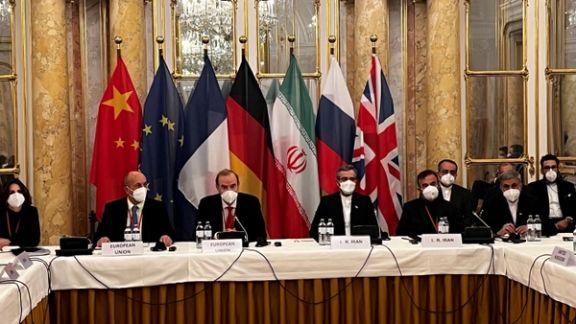
Hardliners in Iran have been trumpeting pessimistic ideas about the outcome of nuclear negotiations in Vienna all Friday as the first round of talks wrapped up.
Friday Prayer Imams took the lead in putting forward excessive demands such as calling for lifting all sanctions against Iran before starting to discuss the United States' return to the JCPOA framework.
On Thursday, Tehran news outlets quoted hardliners as claiming that the Iranian delegation has humiliated the US diplomats by not allowing them to join the talks and forcing them to listen to other negotiators from an adjacent room.
IRGC-linked Fars news agency carried comments by hardliner commentator Mohammad Marandi on pro-Iran Al-Mayadeen TV in Lebanon. Marandi is accompanying the Iranian delegation as an "adviser" who has been seen interpreting for the delegation as most of its members do not speak English.
Fars quoted Marandi as saying that Iran has a plan B in case the United States refuses to return to the 2015 nuclear deal (JCPOA). The plan, Marandi said, includes continuing the nuclear program and strengthening Iran's ties with Asian countries.
The only Asian country that continues any significant trade relations with Iran after the US withdrawal from the JCPOA in 2018 is China with whom Iran has signed a 25-year agreement for cooperation.
Marandi said that Iran is waiting for JCPOA partners to comment on the two draft documents Tehran put forward on Thursday. No official response has been observed on the part of the European trio and the United States and Russia and China to the drafts. However, French President Emmanuel Macron has said that this round of negotiations appears to have remained inconclusive and made no progress.
Thursday evening Russian negotiator Mikhail Ulyanov denied reports that the negotiations have failed to reach any positive results.
Meanwhile, Marandi told Al-Mayadin that Iran has yet a third draft that it has not presented to the JCPOA member states. He added that based on these drafts the US and European sides cannot accuse Iran of having excessive demands. Elsewhere in the interview with Al-Mayadin, Marandi acknowledged that "The European side has expressed its dissatisfaction with the drafts."
According to Reuters, Senior European trio (British, French and German) diplomats taking part in the talks expressed "disappointment and concern" Friday at Tehran's proposed alterations to a text that had been agreed on in previous rounds. "Major changes (have been) demanded (by Iran)," the officials said in a statement, adding that some were incompatible with the JCPOA, adding that it is "unclear how these new gaps can be closed in a realistic timeframe based on Iranian drafts," they said
Some European negotiators have reportedly said that what is included in Iran’s documents is nothing more than what had been agreed but not finalized five months ago. They added that Iran has still not answered some of the questions pending since the end of the first six rounds of talks in June.
Marandi wrote in a tweet: "The US/EU can't have their cake & eat it too. They can't expect the Islamic Republic of Iran to go back to 2015, yet they keep parts of their post-JCPOA sanctions regime intact. The new administration has made it clear that the barbaric Western maximum pressure sanctions must go."
Responding to Marandi's comment, Iranian-American analyst Ali Vaez wrote in a December 2 tweet: "This is why a diplomatic deadlock is the likeliest outcome in Vienna. Iran can’t expect a nuclear deal to unshackle it from sanctions aimed at non-nuclear policies. That is the definition of having your cake and eating it too."
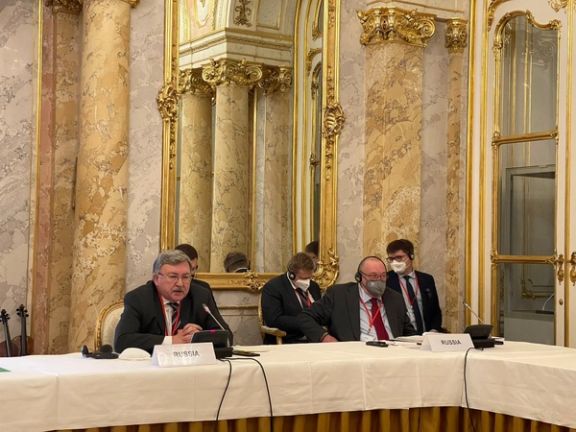
Diplomats negotiating in Vienna over reviving Iran’s 2015 nuclear agreement (JCPOA) will wrap up their first session of talks on Friday with a final meeting.
European and Iranian officials said they will hold a last formal session before adjourning. The United States is not a direct participant in the talks because it withdrew from the agreement in 2018 and imposed heavy sanctions.
The meeting of Iran, France, Germany, Britain, Russia and China is in a format known as the Joint Commission which has bookended previous rounds of talks. The Iranian official said the meeting would be held around noon (1100 GMT). The aim is to resume the talks next week, the European diplomat said.
On Thursday, Iran submitted two documents to the Commission members outlining its position on removing US sanctions and its own nuclear program. Diplomats said they will study Iran’s proposals.
Both Washington and Tehran sounded pessimistic on Thursday about the outcome of the talks, as each called on the other party to show goodwill.
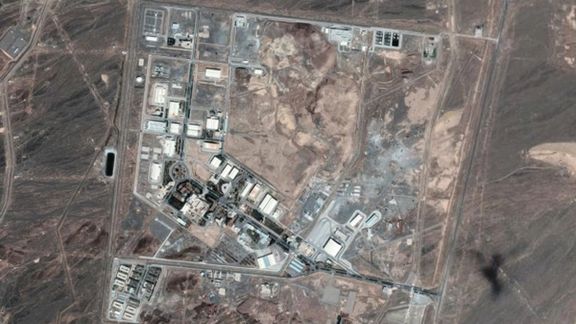
Israel used an Iranian network of agents to conduct sabotage operations against Iran’s nuclear facilities, a new report by The Jewish Chronicle said Thursday.
A large explosion in April that inflicted major damage to the Natanz uranium enrichment site was conducted by recruiting several Iranian scientists working in the complex, the report says. They smuggled explosives into the highly secure facility and at the chosen moment the explosion was triggered remotely.
The Jewish Chronicle (JC) says 90 percent of centrifuge machines enriching uranium were destroyed and the facility was put out of action for nine months. The scientists and people involved in the operation were evacuated from Iran and are in a safe place the report adds.
The Natanz incident rattled the Iranian leadership, because it was so large, they could not hide it, or claim it was a technical accident. The Islamic Republic heavily promotes an image of invincibility to keep control of its restive population and successful sabotage acts damage its image domestically.
Natanz was the target of an earlier attack in July 2020, when a sensitive building for manufacturing new centrifuges blew up. The JC report says that in this operation explosives were imbedded in construction material that Iran bought from Israeli agents and when the time came the Mossad pushed the button.
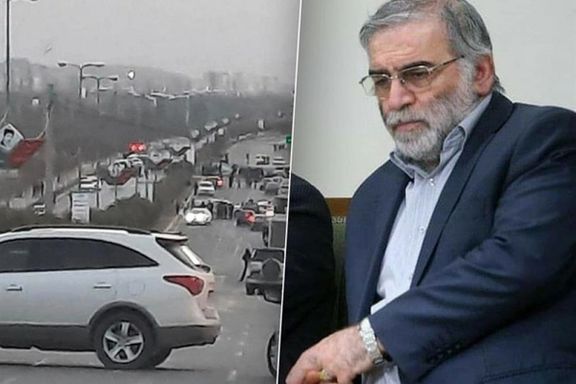
The spectacular assassination of a top Iranian nuclear and military scientist in November 2020 was another sabotage act widely attributed to Israel, when a remotely operated heavy rifle was placed in a van and opened fire at the car of Mohsen Fakhrizadeh, killing him on the spot, despite the presence of a team of bodyguards.
This led to mutual recrimination between security agencies but was particularly embarrassing to the Islamic Revolutionary Guard Corps (IRGC) which had the responsibility to protect Fakhrizadeh.
As the Biden Administration has been trying to revive the Obama-era nuclear agreement with Iran, abandoned by Donald Trump in 2018, Israel has become highly worried that Tehran will get maximum concessions from the US and keep its nuclear program intact. Israeli officials have repeatedly threatened in recent months to use military force if needed to deny Iran a nuclear option.
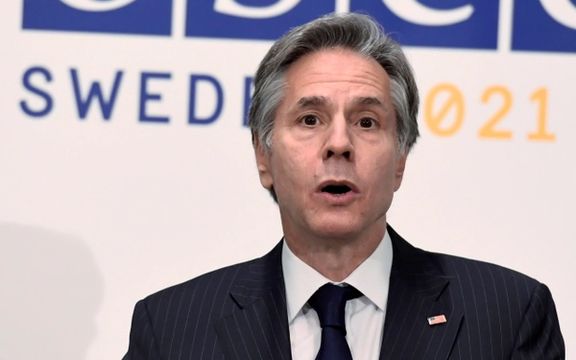
Iran and the United States both signaled pessimism over nuclear talks in Vienna as Tehran presented proposals for reviving its 2015 deal with world powers.
Antony Blinken, US Secretary of State, told reporters in Stockholm, where he is attending the Organization for Security and Cooperation in Europe (OSCE), that “recent moves, recent rhetoric, don’t give us a lot of cause for…optimism.” Blinken put the onus on Iran to “reverse course and engage meaningfully.”
In what might have been a US reaction to new proposals circulated Thursday by Iran to remaining members of the JCPOA (Joint Comprehensive Plan of Action), Blinken said the US would “in the very near future, the next day or so…be in a position to judge whether Iran actually intends now to engage in good faith.”
In Tehran, Hossein Amir-Abdollahian, Iran’s foreign minister, said that “we are not optimistic about the will and intentions of the US and the three European countries.” Amir-Abdollahian was quoted by the official news agency IRNA saying Iran had been encouraged to return to talks over restoring the JCPOA but had nonetheless faced additional US “sanctions on individuals and entities.”
The foreign minister, quoted after a meeting with Japanese foreign minister Yoshimasa Hayashi, said Iran had gone to Vienna, where talks resumed this week after a five-month pause, with “serious determinations and a clear, logical agenda.”
The talks in the Austrian capital formally involve remaining JCPOA signatories – China, France, Germany, Iran, Russia, and the United Kingdom – with a US delegation led by special envoy Rob Malley taking part indirectly.
Iran has stressed the importance of lifting ‘maximum pressure’ sanctions, targeting its oil exports and financial sector, imposed by the US after 2018 when former president Donald Trump left the JCPOA, whereas the US has highlighted Iranian nuclear advances since 2019 beyond limits set by the deal.
‘That will not happen’
"What Iran can't do is sustain the status quo of building their nuclear program while dragging their feet on talks,” Blinken said. “That will not happen.”
Iran’s latest breach of the JCPOA, reported by the International Atomic Energy Agency (IAEA) Wednesday, is to begin enriching uranium at its fortified Fordow plant using relatively advanced centrifuges.
Iran’s lead negotiator Ali Bagheri Kani, who earlier Thursday announced Iran had circulated its new proposals, later met IAEA chief Rafael Mariano Grossi, who subsequently tweeted that they had discussed both “current exchanges in the context of the JCPOA negotiations” and “our own bilateral activities.”
The IAEA would have enhanced monitoring powers under a revived JCPOA, and is meanwhile trying to arrange better access after Iran in February limited agency inspections largely to those required under the Nuclear Non-Proliferation treaty.
Grossi told France24 television Wednesday that be believed talks in Vienna were “trying to build on what was going on before” and that he said an agreement was needed “soon.” The talks were suspended in June, with some diplomats suggesting there was 70-80 percent agreement, and there has been speculation as to how far a new Iranian negotiating team, after the election of President Ebrahim Raisi (Raeesi), would shift Iran’s position.
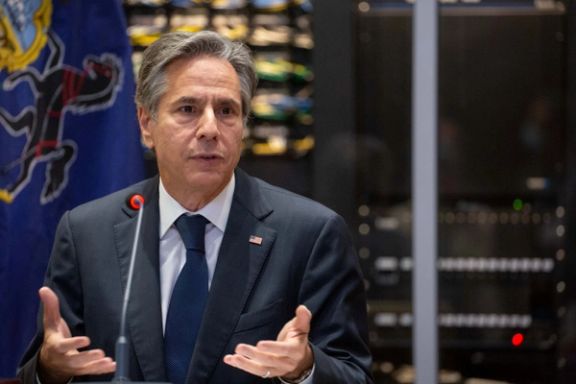
US Secretary of State Antony Blinken Thursday told his Russia counterpart, Sergei Lavrov that the two countries have a shard interest in preventing Iran from obtaining nuclear weapons.
In a meeting of 57 foreign ministers in Stockholm, Sweden, Blinken who was urging cooperation with Russia said, “we have shared interests that we are working on together, including a shared interest in Iran not acquiring a nuclear weapon. Our colleagues are working together in Vienna as the talks proceed.”
Russia is one of six countries who negotiated and signed the 2015 nuclear agreement, the Joint Comprehensive Plan of Action, or JCPOA. The US pulled out of the agreement in 2018, but Russia, China, the United Kingdom, France and Germany who remained in the deal are holding talks with Iran to see if they could revive the agreement.
Russia is Iran’s diplomatic ally and generally backs Tehran’s position in the nuclear dispute, but Russia’s interests in the region also present a complicated picture, as it cultivates good relation with some of Tehran’s regional rivals.
Blinken referred to shared interests on Iran as he was warning Lavrov about Russia taking aggressive action against Ukraine. In recent days, European countries have become alarmed at Russian military moves that could signal action against Ukraine.